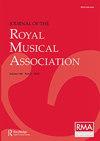圆桌会议:“音乐国际联盟”?音乐制度与战后的国际主义政治
IF 0.5
2区 艺术学
0 MUSIC
引用次数: 0
摘要
这场圆桌会议源于2018-19年的两次聚会,旨在让音乐学家与国际关系史上最近的修订进行对话,这一原则奠定了国际联盟、联合国、世界卫生组织、国际劳工组织等精英政府组织的基础。正如历史学家格伦达·斯拉加(Glenda Sluga)和帕特里夏·克拉文(Patricia Clavin?接下来的案例研究说明了国际主义政策对音乐机构、团体和个人的深远影响。本文章由计算机程序翻译,如有差异,请以英文原文为准。
Round Table: A ‘Musical League of Nations’? Music Institutions and the Politics of Internationalism between the Wars
This round table grew out of two gatherings in 2018–19 that endeavoured to bring musicologists into dialogue with recent revisions in the history of international relations.1 Our specific focus was the interwar period, more often discussed in terms of nationalism – or perhaps at best transnationalism – than within the context of internationalism, a principle that lay behind the foundation of elite governmental organizations such as the League of Nations, the United Nations, the World Health Organization, the International Labour Organization and others. As the historians Glenda Sluga and Patricia Clavin have shown, the construction of objects of global governance by these organizations ran alongside a broader sweep of non-governmental groupings that forwarded the interests of indigenous, working-class, anti-colonialist, anti-slavery and feminist causes.2 What role or roles did music play in these contexts? The case studies that follow illustrate the far-reaching implications of internationalist policies for musical institutions, groups and individuals.
求助全文
通过发布文献求助,成功后即可免费获取论文全文。
去求助
来源期刊
CiteScore
0.50
自引率
0.00%
发文量
16
期刊介绍:
The Journal of the Royal Musical Association was established in 1986 (replacing the Association"s Proceedings) and is now one of the major international refereed journals in its field. Its editorial policy is to publish outstanding articles in fields ranging from historical and critical musicology to theory and analysis, ethnomusicology, and popular music studies. The journal works to disseminate knowledge across the discipline and communicate specialist perspectives to a broad readership, while maintaining the highest scholarly standards.

 求助内容:
求助内容: 应助结果提醒方式:
应助结果提醒方式:


